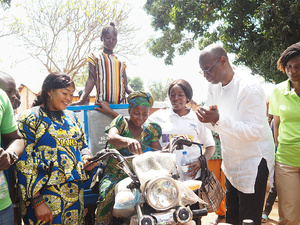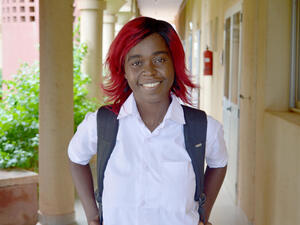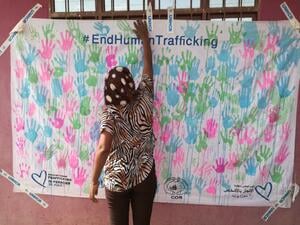Côte d'Ivoire: reports of growing internal displacement
Côte d'Ivoire: reports of growing internal displacement
UNHCR remains concerned about the ongoing developments in Côte d'Ivoire amid reports of growing internal displacement following renewed fighting after the collapse of cease-fire negotiations on Sunday. A government-sanctioned programme to raze shanty towns in Abidjan is also continuing, displacing thousands of local residents and foreigners, including refugees.
As a result of the renewed fighting in Bouaké, a humanitarian inter-agency needs-assessment mission (OCHA, UNICEF, WFP, WHO and UNHCR) that was heading towards Bouaké yesterday (Monday) to assess the dire humanitarian situation there was turned back on the outskirts of Abidjan for security reasons. An advance team left Abidjan again this morning to the capital, Yamoussoukro. Depending on security conditions, the planned inter-agency mission to Bouaké could take place in the next few days.
Worsening conditions in Bouaké, including lack of water, electricity and food supplies, have prompted many residents to flee. According to the Red Cross, between 150,000 and 200,000 residents of Bouaké (pop. 600,000) have fled in recent days to escape fighting and insecurity. Most of them are believed to have sought shelter with families of relatives in other parts of the country.
In Abidjan, meanwhile, the demolition of houses in the city's shanty towns continues, affecting thousands of Abidjan's local and foreign inhabitants, including refugees. The governor of Abidjan announced on Friday that the burning of shanty towns in Abidjan is expected to be completed in one month. During a visit to UNHCR's office in Abidjan on Friday, however, the Minister of Human Rights said the razing of shanty towns would be suspended for ten days. There is still no suspension, however. Such a suspension would be welcomed because it would give humanitarian agencies some more time to find alternative accommodation for the thousands of people, including migrants, refugees and Ivorians, who are being displaced daily. The minister told UNHCR that this is not an operation against foreigners, as many Ivorians are also affected. She reiterated that refugees have always been welcome in Côte d'Ivoire and remain so.
Since 19 September, UNHCR has been assisting more than 800 displaced refugees in five accommodation centres in the town. The refugees are living in very difficult circumstances, in temporary sites where sanitary conditions are far from satisfactory. Latrines are full, water is scarce and centres are overcrowded. Health problems are worsening by the day. The refugees are afraid to be seen in the streets, where anyone speaking another language is suspect. Several refugees have been harassed in the streets. Some have been robbed.
Sixteen per cent of refugees are children under 5, and another 21 percent are under 18. Our NGO partner, Save the Children UK, is taking care of separated children and a UNHCR community services officer is visiting the centres daily to evaluate the situation. On Friday night, a pregnant refugee died of haemorrhaging because she could not be transported to the hospital due to the strict curfew still in place.
Meanwhile, the situation along the borders between Côte d'Ivoire and all neighbouring countries remains tense. UNHCR sub-offices in Guiglo and Tabou reported some movement across the borders towards Liberia, but there has been no large-scale movement. The future of 72,000 refugees in Côte d'Ivoire remains uncertain.






